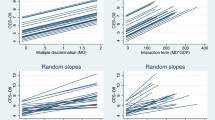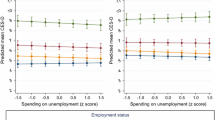Abstract
Purpose
We aimed to study whether country integration policy models were related to inequalities by immigrant status in depressive symptoms in Europe.
Methods
This is a cross-sectional study using data from 17 countries in the sixth wave of the European Social Survey (2012), comparing subjects born either in the country of residence (non-immigrants, N = 28,333) or in a country not classified as “advanced economy” by the IMF (immigrants, N = 2041). Depressive symptoms were assessed with the eight-item version of the Center for Epidemiologic Studies Depression scale. Countries were grouped into three integration policy regimes (inclusive, assimilationist, and exclusionist). Linear regressions were fitted adjusting first by age, sex, and education level, then sequentially by citizenship, perceived discrimination, and socio-economic variables.
Results
In all integration regimes, immigrants report significantly more depressive symptoms than non-immigrants. The gap is the largest in exclusionist countries (immigrants score 1.16, 95% CI 0.65–1.68, points higher than non-immigrants in the depression scale), followed by assimilationist countries (0.85 and 0.57–1.13) and inclusive countries (0.60 and 0.36–0.84). Financial strain explains all the associations in inclusive countries, most of it in assimilationist countries, but only a small part in exclusionist countries.
Conclusions
Across most European countries, immigrants seem to experience more depressive symptoms than the population born in the country, mostly reflecting their poorer socio-economic situation. Inequalities are larger in countries with more restrictive policies. Despite some limitations, this study adds new evidence to suggest that immigrants’ health is shaped by integration policies in their host country.

Similar content being viewed by others
References
Spallek J, Zeeb H, Razum O (2011) What do we have to know from migrants’ past exposures to understand their health status? a life course approach. Emerg Themes Epidemiol 8:6
Acevedo-Garcia D, Sanchez-Vaznaugh EV, Viruell-Fuentes EA, Almeida J (2012) Integrating social epidemiology into immigrant health research: a cross-national framework. Soc Sci Med 75:2060–2068
Lindert J, Ehrenstein OS, Priebe S et al (2009) Depression and anxiety in labor migrants and refugees—a systematic review and meta-analysis. Soc Sci Med 69:246–257
Bhugra D (2004) Migration, distress and cultural identity. Br Med Bull 69:129–141
Tinghög P, Hemmingsson T, Lundberg I (2007) To what extent may the association between immigrant status and mental illness be explained by socioeconomic factors? Soc Psychiatry Psychiatr Epidemiol 42:990–996
Viruell-Fuentes EA (2007) Beyond acculturation: immigration, discrimination, and health research among Mexicans in the US. Soc Sci Med 65:1524–1535
Missinne S, Bracke P (2012) Depressive symptoms among immigrants and ethnic minorities: a population based study in 23 European countries. Soc Psychiatry Psychiatr Epidemiol 47:97–109
Levecque K, Van Rossem R (2015) Depression in Europe: does migrant integration have mental health payoffs? A cross-national comparison of 20 European countries. Ethn Health 20:49–65
Aichberger MC, Schouler-Ocak M, Mundt A et al (2010) Depression in middle-aged and older first generation migrants in Europe: results from the Survey of Health, Ageing and Retirement in Europe (SHARE). Eur Psychiatry 25:468–475
Huddleston T, Niessen J, Ni Chaoimh E, White E (2011) Migrant integration policy Index III. p 221
Hadjar A, Backes S (2013) Migration background and subjective well-being a multilevel analysis based on the European social survey. Comp Sociol 12:645–676
Kunst AE (2015) The assessment of the health equity impact of structural policies: an evaluation of research methods. In: Social and economic policies matter for health equity. Conclusions of the SOPHIE Project. Addenda, Barcelona, pp 61–66
Weldon SA (2006) The institutional context of tolerance for ethnic minorities: a comparative, multilevel analysis of Western Europe. Am J Pol Sci 50:331–349
Meuleman B (2009) The influence of macro-sociological factors on attitudes toward immigration in Europe. A cross-cultural and contextual approach. Dissertation, KU Leuven
Malmusi D (2015) Immigrants’ health and health inequality by type of integration policies in European countries. Eur J Public Health 25:293–299
Ikram U, Malmusi D, Juel K et al (2015) Association between integration policies and immigrants’ mortality: an explorative study across three European countries. PLoS One 10:e0129916
European Social Survey (2014) ESS 6–2012 Documentation report. The ESS data archive. Edition 2.1. p 221
International Monetary Fund (2013) World economic outlook, April 2013: hopes, realities and risks. p 204
Van de Velde S, Bracke P, Levecque K, Meuleman B (2010) Gender differences in depression in 25 European countries after eliminating measurement bias in the CES-D 8. Soc Sci Res 39:396–404
European Social Survey (2014) Weighting European social survey data. p 8
Mahnig H, Wimmer A (2000) Country-specific or convergent? A typology of immigrant policies in Western Europe. J Int Migr Integr 1:177–204
Gotsens M, Malmusi D, Villarroel N et al (2015) Health inequality between immigrants and natives in Spain: the loss of the healthy immigrant effect in times of economic crisis. Eur J Public Health 25:923–929
Penninx R (2006) Dutch immigrant policies before and after the Van Gogh murder. J Int Migr Integr 7:241–254
Callens M-S (2015) Integration policies and public opinion: in conflict or in harmony? Luxembourg Institute of Socio-Economic Research (LISER) Working Paper Series 2015-02. doi:10.2139/ssrn.2694592
Borrell C, Palència L, Bartoll X et al (2015) Perceived discrimination and health among immigrants in Europe according to national integration policies. Int J Environ Res Public Health 12:10687–10699
González-Rábago Y, Martín U, La Parra D, Malmusi D (2014) Participation and representation of immigrant population in the Spanish National Health Survey 2011–2012. Gac Sanit 28:281–286
Golding JM, Aneshensel CS (1989) Factor structure of the center for epidemiologic studies depression scale among Mexican Americans and non-Hispanic Whites. Psychol Assess 1:163–168
Acknowledgements
This research was supported by the European Community’s Seventh Framework Programme (FP7/2007–2013) under Grant agreement 278173 (SOPHIE project).
Author information
Authors and Affiliations
Corresponding author
Ethics declarations
Conflict of interest
On behalf of all authors, the corresponding author states that there is no conflict of interest.
Electronic supplementary material
Below is the link to the electronic supplementary material.
Rights and permissions
About this article
Cite this article
Malmusi, D., Palència, L., Ikram, U.Z. et al. Inequalities by immigrant status in depressive symptoms in Europe: the role of integration policy regimes. Soc Psychiatry Psychiatr Epidemiol 52, 391–398 (2017). https://doi.org/10.1007/s00127-017-1348-2
Received:
Accepted:
Published:
Issue Date:
DOI: https://doi.org/10.1007/s00127-017-1348-2




